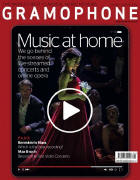Texte paru dans: / Appeared in:
|
|
|
Outil de traduction (Très approximatif) |
|
|
Reviewer:
Fabrice Fitch As with Brahms, Lassus’s late style tends towards concision and seriousness – words he himself used to describe these qualities. Cappella Amsterdam’s previous release in this set of three motet anthologies was devoted to Josquin and drew on penitential works; this second instalment also privileges solemn subject matter. A close comparator is the recital by Collegium Vocale Gent (on the same label, 3/09), which drew entirely from the last motet publication issued in the composer’s lifetime (Graz, 1594). Cappella Amsterdam deliver what Philippe Herreweghe’s ensemble somehow failed to a decade ago. Ensemble cohesion is greater (surprisingly, given Herreweghe’s usual fastidiousness) but details are more persuasively shaped. Lassus is particularly eloquent when texts cry out for imaginative responses. Standouts in this respect are Vidi calumnias, which includes the famous phrase ‘evil under the sun’, Cum essem parvulus (‘When I was a child I spoke as a child …’) and the timeless O mors quam amara (intriguingly, Brahms set these last two in his Vier ernste Gesänge); these are particularly well handled, and it is fitting to end with the concluding motet from Lassus’s posthumous masterpiece, Lagrime di San Pietro. Where the text gives strong cues of an overall architecture (as in the opening Omnia tempus habent), this is confidently executed. Extroversion is not a characteristic one often associates with modern choral ensembles devoted to early repertoires, and one can envisage starker responses to Lassus’s at times startling turns of phrase, but these might require a rather smaller group. Here there are 16 singers, but they can be lithe or monumental as needed. In any case, these works benefit from a certain objective distance. In that spirit, rather than draw attention to himself, Daniel Reuss directs with a certain reserve; that these performances do not sound conducted is meant as a compliment. |
|




